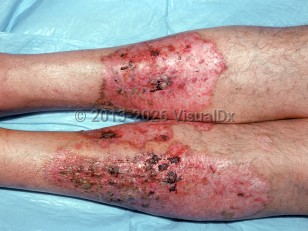Bowel-associated dermatosis-arthritis syndrome
Alerts and Notices
Important News & Links
Synopsis

Bowel-associated dermatosis-arthritis syndrome (BADAS), formerly known as bowel-bypass syndrome, is a noninfectious neutrophilic dermatosis that presents as a complication of bariatric surgery, gastrointestinal surgery with a blind loop, and inflammatory bowel disease (IBD). It is characterized by recurrent inflammatory papules and vesicopustules, along with serum sickness-like symptoms, such as fever, malaise, and arthritis. Onset ranges from 3 months to 5 years postoperatively, with the skin eruption often being one of the last features to appear. Each episode lasts for several days, spontaneously resolves, and often relapses within 4-6 weeks.
BADAS occurs in up to 20% of patients who undergo jejunoileal bypass for morbid obesity, but the numbers are declining with newer surgical techniques. Women appear to have a higher incidence of rheumatologic complications following bowel surgery, but the exact sex predilection is unknown. The arthritis of BADAS is more common in females.
BADAS was originally reported after jejunoileal bypass but has been associated with multiple other surgical procedures, including biliopancreatic diversion and surgeries resulting in blind loops, as well as Crohn disease and ulcerative colitis in the absence of bowel surgery.
The pathogenesis of BADAS is poorly understood, but it is thought that bowel surgery may lead to bacterial overgrowth and bacterial peptidoglycan accumulation, which causes immune-complex formation and deposition in the skin. In the case of IBD, it is thought that inflammation causes a breach in the microbe-containing bowel wall, leading to the immune-complex formation and deposition.
Related topic: blind loop syndrome
BADAS occurs in up to 20% of patients who undergo jejunoileal bypass for morbid obesity, but the numbers are declining with newer surgical techniques. Women appear to have a higher incidence of rheumatologic complications following bowel surgery, but the exact sex predilection is unknown. The arthritis of BADAS is more common in females.
BADAS was originally reported after jejunoileal bypass but has been associated with multiple other surgical procedures, including biliopancreatic diversion and surgeries resulting in blind loops, as well as Crohn disease and ulcerative colitis in the absence of bowel surgery.
The pathogenesis of BADAS is poorly understood, but it is thought that bowel surgery may lead to bacterial overgrowth and bacterial peptidoglycan accumulation, which causes immune-complex formation and deposition in the skin. In the case of IBD, it is thought that inflammation causes a breach in the microbe-containing bowel wall, leading to the immune-complex formation and deposition.
Related topic: blind loop syndrome
Codes
ICD10CM:
K91.2 – Postsurgical malabsorption, not elsewhere classified
SNOMEDCT:
1052354004 – Bowel-associated dermatosis-arthritis syndrome
K91.2 – Postsurgical malabsorption, not elsewhere classified
SNOMEDCT:
1052354004 – Bowel-associated dermatosis-arthritis syndrome
Look For
Subscription Required
Diagnostic Pearls
Subscription Required
Differential Diagnosis & Pitfalls

To perform a comparison, select diagnoses from the classic differential
Subscription Required
Best Tests
Subscription Required
Management Pearls
Subscription Required
Therapy
Subscription Required
References
Subscription Required
Last Reviewed:04/11/2019
Last Updated:07/22/2025
Last Updated:07/22/2025
Bowel-associated dermatosis-arthritis syndrome

